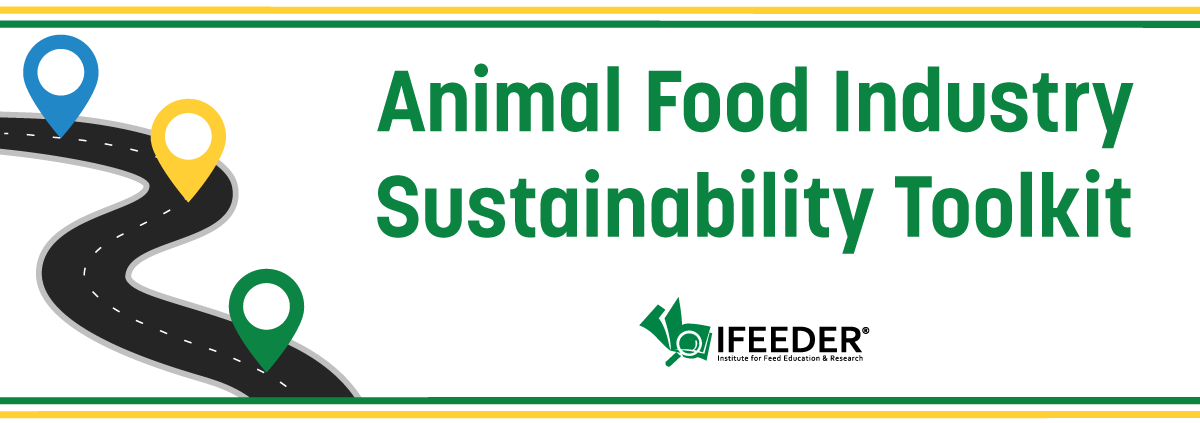IFEEDER Releases Materials to Support Industry Sustainability Progress
January 24, 2023
The U.S. animal food industry is poised to collaborate with and address the future sustainability needs of its customers, thanks in part to new tools unveiled today at the International Production & Processing Expo. The Institute for Feed Education and Research (IFEEDER) released its Animal Food Industry Sustainability Toolkit, intended to drive continuous improvement among the full feed value chain. IFEEDER also shared its definition for “sustainability,” grounding the public charity’s next steps on its multifaceted Sustainability Road Map project.
“Animal food industry members have indicated they are ready and willing to support broader sustainability goals within the food and agriculture community, but their ability to make measurable progress on areas important to their customers and suppliers is at times hindered by not knowing where to start,” said Lara Moody, IFEEDER executive director. “Now, we have provided an ‘on ramp’ for them to help achieve leadership buy-in and employee engagement so that sustainability becomes part of their corporate cultures and shapes future business decisions.”
By leveraging the expertise of The Context Network and animal food industry members and stakeholders, IFEEDER developed a toolkit that equips feed grain and oilseed processors, animal feed and pet food manufacturers, ingredient suppliers and equipment manufacturers with guidance and reference materials to support them in their sustainability journeys. Stakeholder interviews about what sustainability metrics the industry should track and be responsible for led to the development of three key pillars:
- People: feed safety and food safety, human capital, human health and wellness, social good and helping communities, and worker safety.
- Planet: energy usage, greenhouse gases, land, marine and resource use, waste, water quality, and water usage.
- Governance: accountability, legal, regulatory and institutional compliance, stakeholders and shareholder engagement, shareholder rights and transparency.
The toolkit materials, which are supported by 18 months of research and development, are grouped into three stages to support those companies getting started, making progress and reporting out on their set targets and goals. It includes practical tools and resources, such as how to conduct a materiality assessment, a scientific literature review of what the global feed industry has done to date to support broader environmental goals, insights into building the sustainability business case, message mapping to help members communicate their stories to their key audiences and more.
As part of the Sustainability Road Map project, IFEEDER defined “sustainability” for the U.S. animal food industry as “defined and managed by each individual organization to deliver measurable, continuous improvements on the impacts related to people, planet and governance that are most important to them and their stakeholders.”The definition provides guidance for industry and flexibility to meet the definition needs for themselves and their customers.
“We know that industry member sustainability efforts will evolve and with them, so will our tools,” Moody said. “However, with the launch of this industrywide suite of materials, we now have a solid starting point, thanks to the 23 companies who partnered with us to show the U.S. animal food industry is committed to reducing its environmental impact and helping consumers feel good about where their food comes from.”
Input into the Sustainability Road Map project and supporting toolkit were provided by the following companies who also provided monetary contributions for this effort: Arm & Hammer Animal and Food Production/Church & Dwight Company; Animix, LLC; Anipro/Xtraformance Nutrition; BASF Corporation; Bayer CropScience LP; Belstra Milling Co.; Berg+Schmidt America, LLC; Bill Barr & Company, Inc.; Cargill; CJ Bio America, Inc.; Darling Ingredients; DSM Nutritional Products; ED&F Man Liquid Products LLC; Elanco Animal Health; Kemin Industries, Inc.; International Ingredient Corporation; ILC Resources; The Mosaic Company; Sustainable Oils, Inc.; United Animal Health, Inc.; Western Milling; Westway Feed Products and Zinpro Corporation. The toolkit is available for free to AFIA members and IFEEDER donors on IFEEDER’s website and available for purchase to nonmembers in AFIA’s Online Store. AFIA members and IFEEDER donors are invited to register for a member webinar on Wednesday, Feb. 1, at 11 a.m. ET to learn more about how to use the toolkit.
